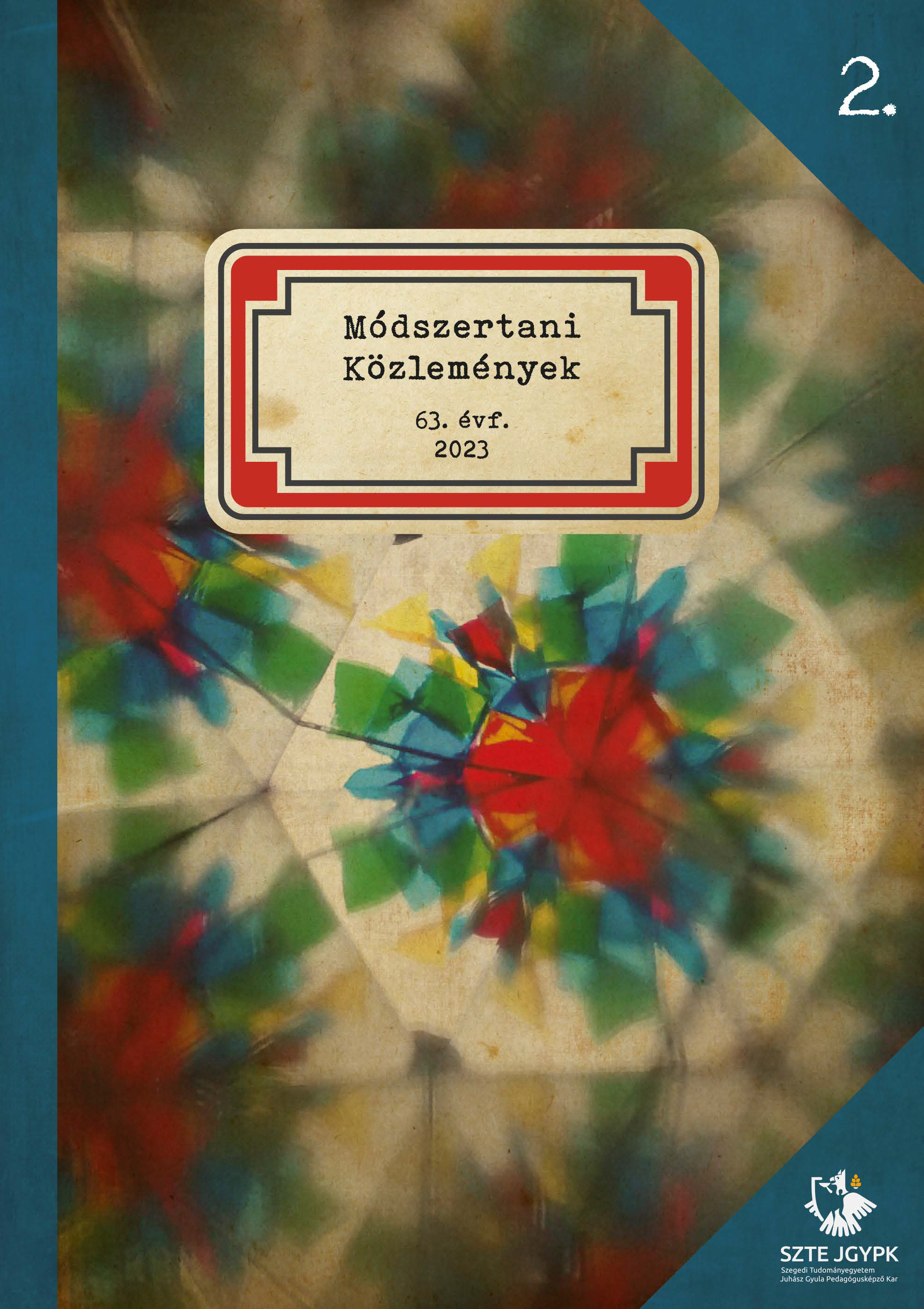Analysis of differentiating practices of mainstream teachers and special needs teachers
Main Article Content
Abstract
For teachers, it is not an easy task how to effectively teach and develop students with different interests, from different cultural backgrounds, speaking different languages, with different experiences of the world, and with different skill levels within a group of students. In addition to special educational needs, the heterogeneity of pupils is further coloured by low socio-cultural backgrounds, but let us not forget pupils of average ability (but with different learning styles) or even gifted pupils. The literature notes a number of teaching practices related to differentiation, which are methods for dealing with student heterogeneity. However, research suggests that differentiation as a practice has not yet become universal, with some teachers feeling overwhelmed when differentiating (Reis, McCoach, Little, Muller, Kaniskan, 2011), some complaining that their training did not prepare them to use differentiation effectively (Idol, 2006), and some who simply do not understand the point of differentiation. The study compares the differentiation practices of mainstream teachers and special needs teachers. We seek to find out whether there is a difference between the differentiation strategies used by teachers and special educators in our sample.
Article Details
References
Anderson, K. (2007): Differentiating instruction to include all students. Preventing School Failure, 51. 3. sz. 49−54.
George, P. (2005): A rationale for differentiating instruction in the regular classroom. Theory Into Practice, 44. 3. sz. 185−103.
Hancock, E. és Gallard, A. (2004): Preservice science teachers’ beliefs about teaching and learning. The influence of K – 12 field experiences. Journal of Science Teacher Education, 15. 4. sz. 281–291. https://www.researchgate.net/publication/227197853_Preservice_Science_Teachers’_ Beliefs_About_Teaching_and_Learning_The_Influence_of_K-12_Field_Experiences (2023.03.18.)
Heacox, D. (2006): Differenciálás a tanításban, tanulásban. Kézikönyv a 3-12. osztály számára. Szabad Iskolákért Alapítvány, Budapest. Hosszu Tímea (2021): Vajdasági pedagógusok differenciálási gyakorlata az inkluzív oktatásban. In: Hosszu Tímea és Tóthné Aszalai Anett (szerk.): „Együtt az úton... innen és határon túl” Tanulmánykötet. Szegedi Tudományegyetem Juhász Gyula Pedagógusképző Kar Gyógypedagógus- képző Intézet, Szeged. Idol, L. (2006): Toward inclusion of special education students in general education. Remedial and Special Education, 27. 2. sz. 77–94. https://www.researchgate.net/publication/258183289_Toward_Inclusion_of_Special_Education_ Students_in_General_Education_A_Program_Evaluation_of_Eight_Schools (2023.03.18.)
Kis-Tóth Lajos, Lengyelné Molnár Tünde és Tóthné Parázsó Lenke (2013): Statisztikai programrendszerek. Eszterházy Károly Főiskola, Eger.
Koehler, Shelby (2010): Effects of Differentiating for Readiness, Interest and Learning Profile on Engagement and Understanding. Mathematical and Computing Sciences Masters, Paper 91. https://fisherpub.sjf.edu/cgi/viewcontent.cgi?article=1090&context=mathcs_etd_masters (2023.02.15.)
Mansour, N. (2009): Science teachers’ beliefs and practices: issues, implications and research agenda. International Journal of Environmental and Science Education, 4. 1. sz. 25–48. https:// www.researchgate.net/publication/237303115_Science_Teachers’_Beliefs_and_Practices_ Issues_Implications_and_Research_Agenda (2023.03.18.)
Miller, P. A. (2002): Theories of development psychology. Worth Publishers, New York. Pajares, M. F. (1992): Teachers’ beliefs and educational research: cleaning up a messy construct. Review of Educational Research, 62. 3. sz. 307–332. https://ssrlsite.files.wordpress.com/2018/02/pajares-1992-teachers_-beliefs-and-educational- research-cleaning-up-a-messy-construct.pdf (2023.03.18.)
Pozas M., Letzel V. és Schneider C. (2020): Teachers and differentiated instruction: exploring differentiation practices to address student diversity. Journal of Research in Special Educational Needs, 20. 3. sz. 217–230. https://nasenjournals.onlinelibrary.wiley.com/doi/ full/10.1111/1471-3802.12481 (2023.03.18.)
Reis, S. M., McCoach, D. B., Little, C. A., Muller, L. M. és Kaniskan, R. B. (2011): The effects of differentiated instruction and enrichment pedagogy on reading achievement in five elementary schools. American Educational Research Journal, 48. 2. sz. 462–501.
Rohony Noémi (2022): Többségi pedagógusok és gyógypedagógusok differenciáló gyakorlatának összehasonlító vizsgálata. Szakdolgozat. SZTE JGYPK Gyógypedagógus-képző Intézet, Szeged.
Sfard, A. (1998): On two metaphors for learning and the dangers of choosing just one. Educational Researcher, 27. 2. sz. 4–13. https://www.researchgate.net/publication/304552704_On_Two_Metaphors_for_Learning_ and_the_Dangers_of_Choosing_Just_One (2023.03.18.)
Staub, F. C. és Stern, E. (2002): The nature of teachers’ pedagogical content beliefs matters for students’ achievement gains: Quasi-experimental evidence from elementary mathematics. Journal of Educational Psychology, 94. 2. sz. 344–355. https://ethz.ch/content/dam/ethz/special-interest/gess/ifv/professur-lehr-und-lernforschung/ publikationen-stern/staub_stern_2002.pdf (2023.03.18.)
Tomlinson C. A. (1999): The differentiated classroom. Responding to the Needs of All Learners. Asocciation for Supervision and Curriculum Development, Alexandria.
Tomlinson C. A. (2001): How to differentiate instruction in mixed – ability classrooms. Asocciation for Suprevision and Curriculum Development, Alexandria.
Tomlinson, C. A. (2003): Fulfilling the promise of a differentiated classroom: Strategies and tools for responsive teaching. Association for Supervision and Curriculum Development, Alexandria.
Tomlinson, C. A. és Allan, S. D. (2000): Leadership for differentiating schools & classrooms. Association for Supervision and Curriculum Development, Alexandria.
Tyack, D., Anderson, J., Cuban, L., Kaestle, C., Bernard, S., Mondale, S. és Streep, M. (2001): School: The story of American public education. Beacon Press, Boston. Weselby, C. (2021): What is differentiated instructions? Examples of how to differentiate instruction in the classroom. https://resilienteducator.com/classroom-resources/examples-of-differentiated-instruction/ (2023.03.25.)

